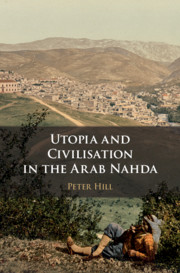Book contents
- Utopia and Civilisation in the Arab Nahda
- Utopia and Civilisation in the Arab Nahda
- Copyright page
- Contents
- Figures
- Acknowledgements
- Note on Transliteration, Dates and Abbreviations
- Introduction
- 1 Who Made the Nahda?
- 2 The Discourse of Civilisation
- 3 A Place in the World
- 4 An Arab Utopian
- Conclusions
- Bibliography
- Index
Conclusions
Published online by Cambridge University Press: 19 December 2019
- Utopia and Civilisation in the Arab Nahda
- Utopia and Civilisation in the Arab Nahda
- Copyright page
- Contents
- Figures
- Acknowledgements
- Note on Transliteration, Dates and Abbreviations
- Introduction
- 1 Who Made the Nahda?
- 2 The Discourse of Civilisation
- 3 A Place in the World
- 4 An Arab Utopian
- Conclusions
- Bibliography
- Index
Summary
In 1898, Muḥammad al-Muwayliḥī began the serial publication of what would become his ironic masterpiece Ḥadīth ʿĪsā ibn Hishām (ʿĪsā ibn Hishām’s Tale). Its major premise was the miraculous return from the dead, in 1890s Cairo, of one of the great men of Mehmed Ali’s time. In real life he was Ahmad Manikli Pasha (c. 1795–1862), general of the Syrian campaigns and Minister of War in the 1830s, governor of the Sudan in the 1840s (where he earned a reputation for brutality for his subjugation of the Hadandawa Beja tribes), commander of the Egyptian division in the Crimean War in the 1850s. Autocratic, Ottoman-speaking, pious after his fashion, Muwayliḥī’s resurrected Pasha finds himself at a loss in the new Cairo of the turn of the twentieth century, despite the best efforts of his guide, theʿĪsā ibn Hishām of the title. The lower classes are insubordinate, the police and legal system corrupt and chaotic, the language of administration Europeanised and incomprehensible, the sons of the old elite and nouveaux riches alike given over to wine and women, and to gambling – both in nightclubs and on the stock exchange. A volatile financialised economy, the glaring presence of Europeans and European-style culture and the ever-present shadow of the British occupation contribute to the febrile atmosphere of fin de siècle decadence and insecurity. In certain scenes, as when the Pasha encounters the sons of his former comrades of Mehmed Ali’s days, we are left with the strong impression of a once-great ruling class that has lost both its moral compass and its power.
- Type
- Chapter
- Information
- Utopia and Civilisation in the Arab Nahda , pp. 245 - 255Publisher: Cambridge University PressPrint publication year: 2020



